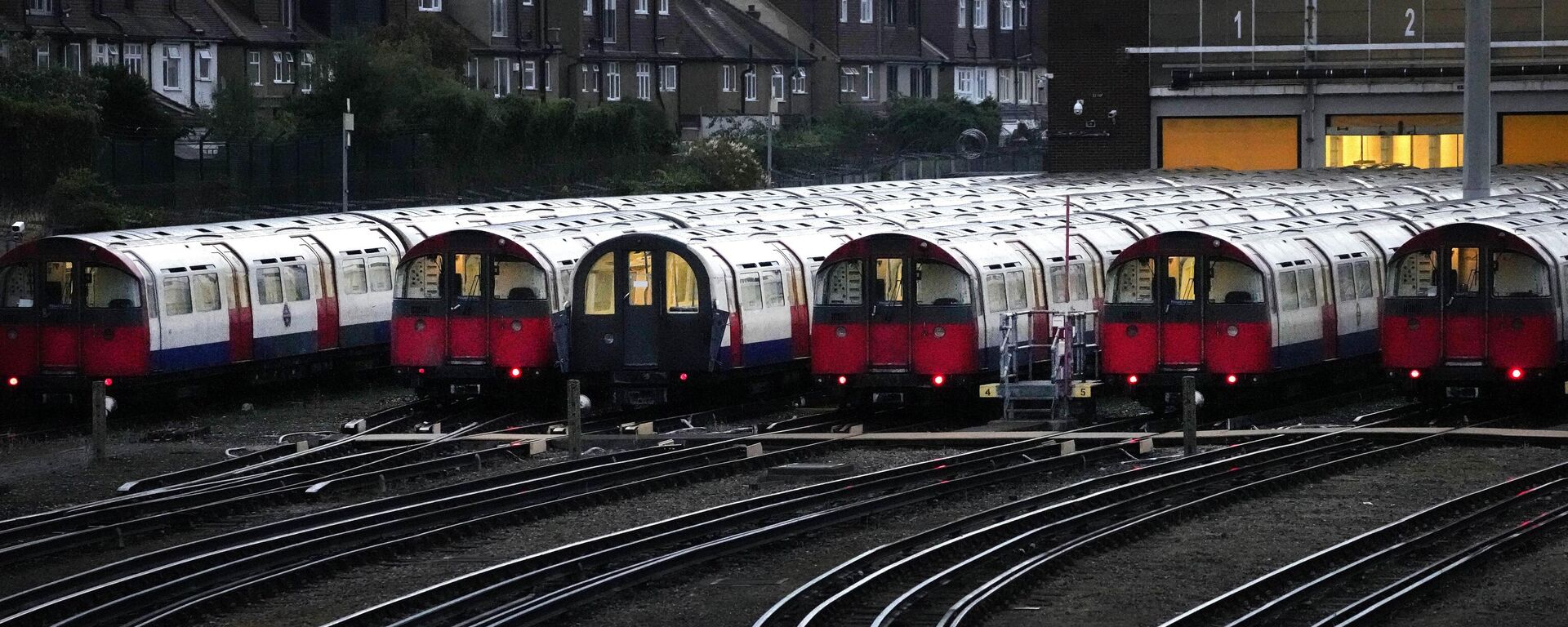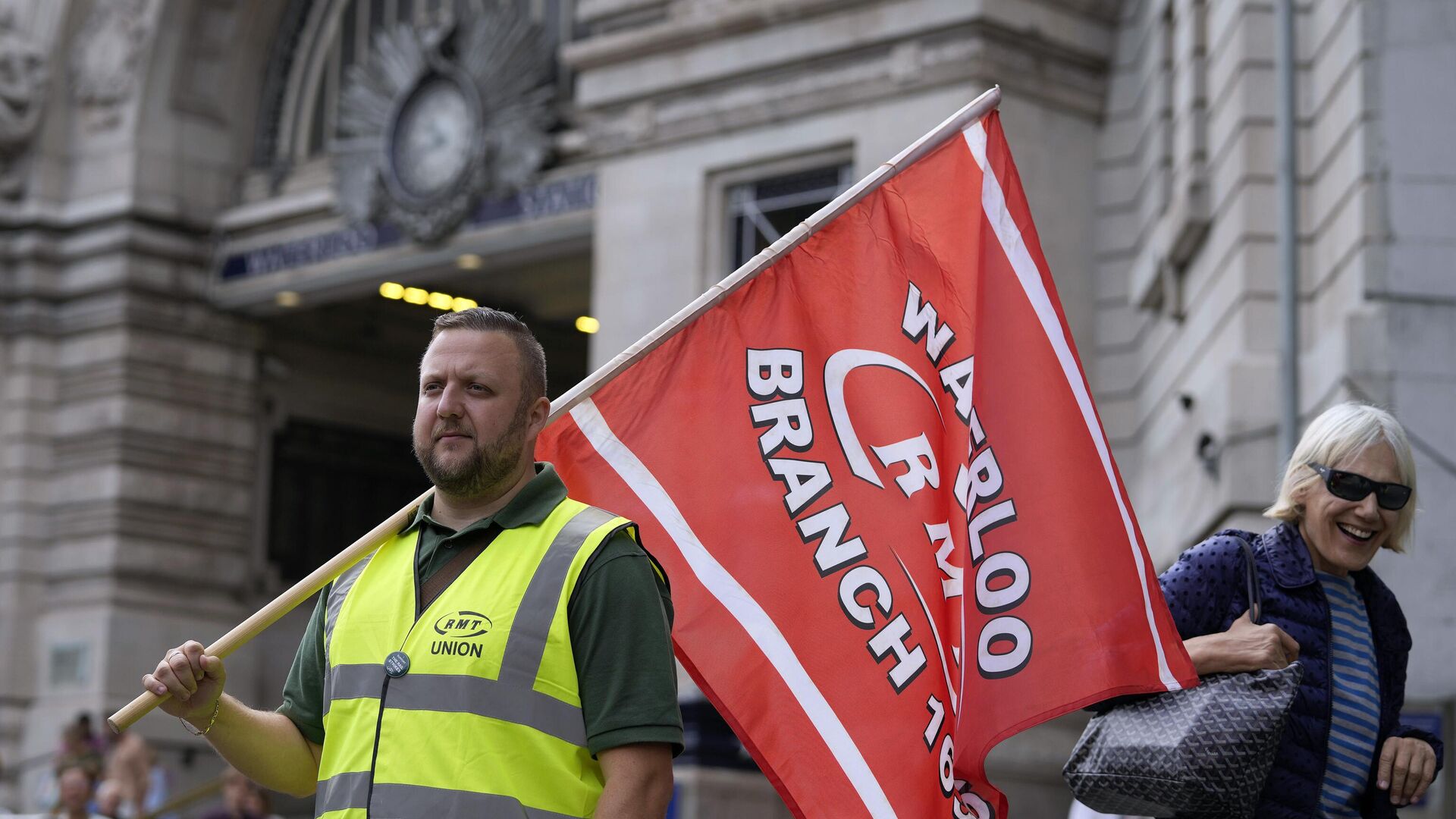https://sputnikglobe.com/20221207/british-pm-warned-he-cannot-beat-wave-of-strikes-amid-inflation-crisis-1105156936.html
British PM Warned He Cannot Beat Wave of Strikes Amid Inflation Crisis
British PM Warned He Cannot Beat Wave of Strikes Amid Inflation Crisis
Sputnik International
Rampant inflation — caused by Western sanctions and trade embargoes on Russia — has promoted industrial disputes across diverse sectors of the British economy... 07.12.2022, Sputnik International
2022-12-07T16:20+0000
2022-12-07T16:20+0000
2023-05-28T15:25+0000
world
strike
rishi sunak
britain
great britain
inflation
united kingdom (uk)
https://cdn1.img.sputnikglobe.com/img/07e6/0b/19/1104698441_0:0:3073:1728_1920x0_80_0_0_877562284beea4a9a7ebe3ce9262dfca.jpg
Economists have cautioned British Prime Minister Rishi Sunak to give in to striking workers' wage demands.Nurses, ambulance workers and educators are all set to walk out over the next few months in a new "winter of discontent" as a five per cent public-sector pay offer falls far short of inflation, currently running at over 11 points.Railway union RMT is balloting members for additional action from Christmas Eve to December 27, on top of a mid-month strike, while a postal workers stoppage could affect deliveries of gifts and greetings cards.Speaking at Prime Minister's Questions in Parliament on Wednesday lunchtime, Sunak insisted that while "Hard-working families" were "facing challenges" the government had been "reasonable" in its pay offers to public-sector workers."It has accepted the recommendations of a pay review body, giving pay rises in many cases higher than the private sector," the PM said.London School of Economics Professor Charles Goodhart, a former Bank of England policymaker, said the government would face an entire "year of discontent" if it did not come to terms with trade unions.He told the Bank of England Watchers conference last week Sunak's stance "is not going to succeed, and it’s not going to last," and that a "public sector wage explosion" in the next two years was unavoidable.Goodhart said that the strikers had popular support after being lauded by government for their work during the COVID-19 pandemic — which had additionally seen 600,000 people drop out of the labor market, making it harder to recruit.Downing Street's attempts to keep public pay down was a "form of prices and incomes control" the academic said, which would cause "all kinds of mayhem — a combination of declining recruitment, worsening services and increasing industrial strife."Sweetener to Boost Labor SupplyToscafund Asset Management chief economist Savvas Savouri said the government was "delusional" to think it had "a strong hand against whichever union happens to be their adversary."He said ongoing strikes would lead to supply crises and staff shortages, further fuelling inflation and undermining Sunak's growth plan, warning that "Wage growth will prove more stubborn, and so too inflation." With many private-sector employers offering bigger pay rises "through gritted teeth," Savouri advised the government should up its offer for 2022 to eight or even 10 per cent — but as part of a long-term deal adding up to just 18 per cent over five years, or 3.6 per cent per year.That would have the dual benefit of avoiding costly strikes and enlarging the labor pool "encouraging European Union nationals with settlement status who departed our shores at the onset of Covid lockdowns to return," he argued.
https://sputnikglobe.com/20221206/british-rail-union-to-ballot-members-for-strike-over-christmas-1105095910.html
britain
great britain
united kingdom (uk)
Sputnik International
feedback@sputniknews.com
+74956456601
MIA „Rossiya Segodnya“
2022
James Tweedie
https://cdn1.img.sputnikglobe.com/img/07e4/08/1c/1080307270_0:3:397:400_100x100_80_0_0_7777393b9b18802f2e3c5eaa9cbcc612.png
James Tweedie
https://cdn1.img.sputnikglobe.com/img/07e4/08/1c/1080307270_0:3:397:400_100x100_80_0_0_7777393b9b18802f2e3c5eaa9cbcc612.png
News
en_EN
Sputnik International
feedback@sputniknews.com
+74956456601
MIA „Rossiya Segodnya“
Sputnik International
feedback@sputniknews.com
+74956456601
MIA „Rossiya Segodnya“
James Tweedie
https://cdn1.img.sputnikglobe.com/img/07e4/08/1c/1080307270_0:3:397:400_100x100_80_0_0_7777393b9b18802f2e3c5eaa9cbcc612.png
strike, rishi sunak, britain, great britain, inflation, united kingdom (uk)
strike, rishi sunak, britain, great britain, inflation, united kingdom (uk)
British PM Warned He Cannot Beat Wave of Strikes Amid Inflation Crisis
16:20 GMT 07.12.2022 (Updated: 15:25 GMT 28.05.2023) Rampant inflation — caused by Western sanctions and trade embargoes on Russia — has promoted industrial disputes across diverse sectors of the British economy, with everyone from postal workers to barristers threatening to strike.
Economists have cautioned British Prime Minister
Rishi Sunak to give in to striking workers' wage demands.
Nurses, ambulance workers and educators are all set to walk out over the next few months in a new
"winter of discontent" as a five per cent public-sector pay offer falls far short of inflation, currently running at over 11 points.
Railway union RMT is balloting members for additional action from Christmas Eve to December 27, on top of a mid-month strike, while a postal workers stoppage could affect deliveries of gifts and greetings cards.
Speaking at Prime Minister's Questions in Parliament on Wednesday lunchtime, Sunak insisted that while "Hard-working families" were "facing challenges" the government had been "reasonable" in its pay offers to public-sector workers.
"It has accepted the recommendations of a pay review body, giving pay rises in many cases higher than the private sector," the PM said.
But he warned that "if the union leaders continue to be unreasonable, then it is my duty to take action to protect the lives and livelihoods of the British public," justifying the government's pursuit of new legislation limiting the right to strike.
London School of Economics Professor Charles Goodhart, a former Bank of England policymaker, said the government would face an entire "year of discontent" if it did not come to terms with trade unions.
He told the Bank of England Watchers conference last week Sunak's stance "is not going to succeed, and it’s not going to last," and that a "public sector wage explosion" in the next two years was unavoidable.
Goodhart said that the strikers had popular support after being lauded by government for their work during the COVID-19 pandemic — which had additionally seen 600,000 people drop out of the labor market, making it harder to recruit.
Downing Street's attempts to keep public pay down was a "form of prices and incomes control" the academic said, which would cause "all kinds of mayhem — a combination of declining recruitment, worsening services and increasing industrial strife."
"The pressures imposed are so great there is going to have to be a public sector wage explosion, certainly no later than the next general election when the incoming government is going to have to rectify the distortions that are already there," Goodhart said.

6 December 2022, 12:07 GMT
Sweetener to Boost Labor Supply
Toscafund Asset Management chief economist Savvas Savouri said the government was "delusional" to think it had "a strong hand against whichever union happens to be their adversary."
He said ongoing strikes would lead to supply crises and staff shortages, further fuelling inflation and undermining Sunak's growth plan, warning that "Wage growth will prove more stubborn, and so too inflation."
With many private-sector employers offering bigger pay rises "through gritted teeth," Savouri advised the government should up its offer for 2022 to eight or even 10 per cent — but as part of a long-term deal adding up to just 18 per cent over five years, or 3.6 per cent per year.
That would have the dual benefit of avoiding costly strikes and enlarging the labor pool "encouraging European Union nationals with settlement status who departed our shores at the onset of Covid lockdowns to return," he argued.
"The reality is we need to see a noticeable one-off rise in the wage level to quickly inject a fresh supply of workers into the UK," Savouri said. "This would deliver a host of disinflationary benefits, not least stopping supply-restricting – and thus inflation fuelling – strike action."




